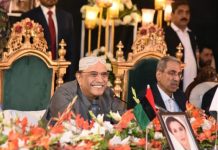LAHORE: Following the judiciary-focused 26th Amendment passed earlier this month, Prime Minister Shehbaz Sharif and Pakistan People’s Party (PPP) Chairman Bilawal Bhutto Zardari discussed the proposed “27th constitutional amendment centred on provincial rights” in a meeting today, sources said.
Both sides hailed the successful passage of the 26th Constitutional Amendment on October 21, giving credit to all the allies.
The premier expressed gratitude to the PPP for supporting the PML-N-led coalition government’s efforts towards economic stability, doubling down on the commitment to serving the nation.
The coalition government’s initiatives led to significant disinflation, with other economic indicators also showing positive signs, he noted.
Pledging to work alongside the ruling PML-N to strengthen democracy and parliament, the PPP chief asserted that the 26th Amendment would serve as an effective legislation, blocking the path of undemocratic forces.
The sources privy to the matters informed the Geo News that the ruling parties agreed on introducing the 27th constitutional amendment aimed at addressing the concerns raised by the provinces.
The meeting also decided to take the opposition party Jamiat Ulema-e-Islam-Fazl (JUI-F), the government’s ally Muttahida Qaumi Movement-Pakistan (MQM-P), and other parties in confidence on the next major legislation, the sources added.
Speaking to Geo News programme “Naya Pakistan”, Adviser to the PM on Political and Public Affairs Rana Sanaullah confirmed that the top leaders of the ruling coalition discussed the 27th constitutional amendment in the Lahore meeting today.
The coalition government would aim to incorporate legislation requested by various parties in the upcoming constitutional amendment, he said, adding that both sides had yet to reach a consensus on certain points discussed in today’s meeting.
He specifically pointed to the MQM-P’s long-standing demand for legislation to amend Article 140A to empower local government, including a request to allocate funds to local government (LG) institutions similar to the financing provided to provincial administrations.
The adviser added that both parties had only agreed to the continuation of the Special Parliamentary Committee led by PPP leader Khursheed Shah to deliberate the constitution-related matters.
To a question related to flaws in the 26th Amendment, the PM’s aide rubbished the claims and said that it was a “perfect” judiciary-centric legislation.
He also clarified that the PML-N government would not indulge in any unilateral initiative and would not bring any constitutional amendment to the parliament without evolving consensus.
After multiple rounds of talks between the treasury and the opposition lawmakers, the incumbent government passed the set of constitutional amendments, including provisioning a fixed three-year term for the Chief Justice of Pakistan (CJP).
It also established a deadline of January 1, 2028, for the end of the practice of Riba (interest-based banking) in the country — a clause added to the draft amendments at the suggestion of the Maulana Fazl-ur-Rehman-led JUI-F, which gave the government a tough time in presenting the draft of the amendment bill.
President Asif Ali Zardari signed the “26th Amendment Bill” into law on the advice of PM Shehbaz following the approval of the said legislation by the parliament.
However, the major opposition party — the Pakistan Tehreek-e-Insaf (PTI) — strongly opposed the judicial reforms and termed it an attack on the “independence of the country’s judiciary” besides announcing its plan to revoke the newly enacted legislation whenever it returned to power in the Centre.

















